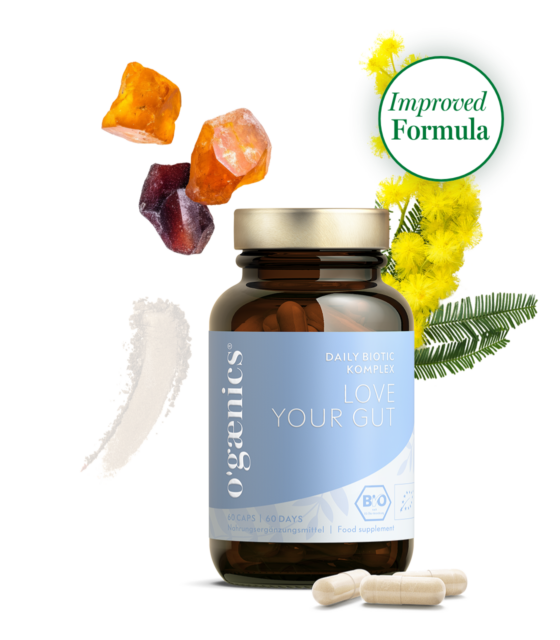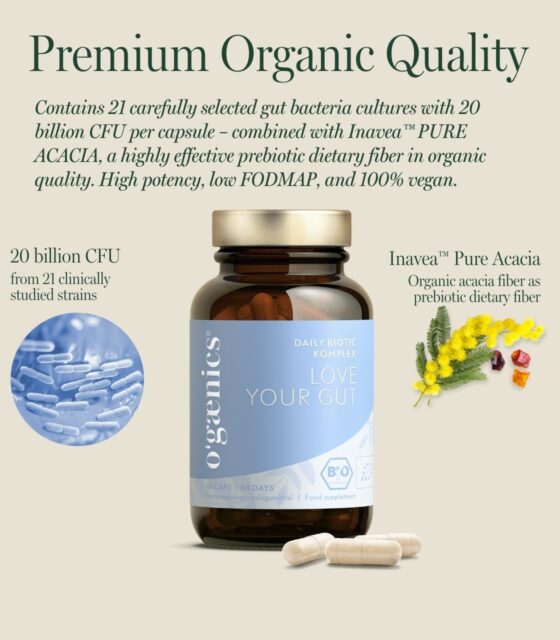Here’s what you can do to protect your gut health during menopause.
As you may already know, our gut microbiome changes with age. But now, according to the latest study results, menopause is even said to have a direct impact on our gut health. Find out what this means for you and what you can do for a healthy gut during menopause in this article.
What is the gut microbiome?
The intestinal microbiome, also known as intestinal flora, is the term used to describe the totality of all microorganisms that reside in the intestine.
These primarily include bacterial strains (primarily in the colon), which are supposed to protect us from unwanted viruses and fungi and strengthen our immune system. In addition, their role is to provide us with nutrients by producing vitamins and short-chain fatty acids.
In addition, the intestinal bacteria and their interaction with hormone balance are increasingly becoming the focus of scientific attention.
How does the gut microbiome change during menopause?
It sounds a bit bizarre: however, according to a recent meta-study in the International Journal of Women’s Health (1), during menopause, our gut microbiome is said to become increasingly similar to a man’s microbiome.
The reason for this is: in addition to the sex hormone estrogen, the amount of the sex hormone progesterone also continues to decrease during menopause. This decreased progesterone level is thought to directly affect and negatively impact bowel function.
The consequences of an altered gut microbiome during menopause.
The consequences of an altered gut microbiome during menopause can be, according to current studies:
- A minimized intestinal microbiome and thus a lower diversity of protective microorganisms.
- Increased permeability of the intestinal barrier, which under certain circumstances can lead to “leaky gut syndrome
- a lower nutrient uptake
- a reduced production of short-chain fatty acids, which are involved in the regulation of appetite and energy metabolism
Here’s what you can do for your gut health during menopause
Therefore, in order to positively influence your intestinal health during menopause, you should take the following tips to heart and implement them:
1. avoid preservatives in food products
Preservatives are intended to change the nature of a product so that it has a longer shelf life, for example. However, these additives, such as emulsifiers, can damage the intestinal mucus barrier (2,3).
This can make it more permeable and thus promote the penetration of foreign substances and pollutants. In the worst case, this can lead to inflammatory bowel diseases, autoimmune diseases or allergies.
Therefore, you should avoid them and prefer to use unprocessed products.
2. consume enough fiber
Dietary fiber (plant fiber) is incredibly important for our gut health. On the one hand they saturate us well and on the other hand they support our digestion, prevent constipation and bind toxins in the intestines for faster elimination. You’ll find them primarily in:
- Fruit – such as berries, apples, pears, avocados,
- Vegetables – such as cabbage varieties, salsify, carrots, fennel and potatoes,
- Whole grain products – such as rye, barley, spelt and oats,
- Legumes – such as lentils, beans, peas, chickpeas and soybeans,
- Dried fruits – such as dates, figs and prunes,
- Nuts – such as almonds and macadamia nuts,
- Seeds – such as flax seeds, chia seeds and sesame seeds.
- Dark chocolate – with a cocoa content of 70 to 75 percent.
You can distinguish between insoluble (cellulose) and soluble (inulin) dietary fibers:
- Insoluble fiber provides the volume of bowel movements and thus accelerates elimination.
- Soluble fiber, on the other hand, serves as a prebiotic and nourishes our intestinal flora with vital microorganisms.
Too much sugar, on the other hand, is poison for a healthy intestinal environment and should also be replaced with healthier alternatives such as fruit or dried fruit.
You can find out how fiber can support your detox in the article “Detox: What you can do in everyday life to detox”.
3. intestinal health with fermented foods
Fermented foods support our intestines as a natural probiotic and increase the diversity of intestinal flora. The healthy thing about fermented foods are especially the lactic acid bacteria, which support digestion. Among them are:
- Sauerkraut,
- Kombucha,
- Tempeh,
- Miso,
- Kimchi,
- Kefir or
- Yogurt.
These foods should be on your menu daily for a healthy gut.
4. daily intake of probiotics
So you can positively influence your gut health during menopause through diet. The only problem with this is that you don’t know how much of which good bacteria you have now ingested.
To ensure that you are optimally supplied with the right bacterial strains, it is therefore recommended to additionally take prebiotics and probiotics via dietary supplements.
However, not all supplements are the same: In order to really promote your intestinal health, it is enormously important to pay attention to high-quality products of organic quality.
Organic quality guarantees you that the ingredients come from plants grown without the use of toxins. Thus, our intestine absorbs much less harmful substances and is thus relieved.
To balance your digestion and well-being, we recommend taking Love Your Gut Daily Biotic Complex as a daily supplement to a balanced and healthy diet.
This contains 10 billion replicable intestinal bacteria per capsule from 21 clinically researched bacterial strains. In addition, the combined with the vegetable fiber inulin from organic agave.
-
Bestseller
Love Your Gut
Bio Daily Biotic Complex Premium for the gut: 21 bacterial strains plus organic fiberab 39,90 €
Conclusion
So there is a suspicion: that during our menopause our gut microbiome changes and becomes more similar to that of men. Thus, the consequences for us women could be a higher permeability of the intestine and a low diversity of protective microorganisms.
In order to counteract this and continue to enjoy a healthy intestine during menopause, it is important to strengthen our intestinal health. You can do this by eating a healthy, balanced diet that is high in fiber and by taking additional high-quality probiotics and prebiotics. For this, feel free to look around our online store.
If you want to learn more about gut health, probiotics and the microbiome, read on here:
- Optimize your gut health with synbiotics
- Skin problems? The gut-skin axis is behind it
- The crucial role of the microbiome for gut health
- Irritable bowel syndrome: Vitamin D can banish flatulence
- How the microbiome influences our health and ageing
- Bloated belly while traveling: how to prevent it
- What you should look for in a probiotic
- What can I expect when I take probiotics?
(1) Spotlight on the Gut Microbiome in Menopause: Current Insights , Peters BA, et al. Int J Womens Health. 2022
(2) Dietary emulsifiers impact the mouse gut microbiota promoting colitis and metabolic syndrome, Chassaing, B. et al .Nature 519, 92-96 (2015).
(3) Impact of Food Additives on Gut Homeostasis, Laudisi F, et al. Nutrients. 2019




 No products in the cart.
No products in the cart.